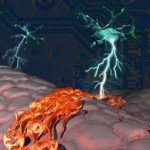HEALTH GUIDELINES FROM THE QURAN* AND SUNNAH**
The Quran is not a book of medicine or of health sciences, but in it there as a guidelines for health and treatment of diseases. Prophet Muhammad (PBUH) has been sent as an example to mankind so his Traditions in matters of health and personal hygiene are also a guide for his followers. We begin our discussion with the following verse, “Everything good that happens to you (O mankind) is from God. Everything evil that happens to you is from your own actions” (4:79). Pathology (disease) is defined by the famous pathologist, William Boyd, as “physiology (natural state) gone wrong.” It is our tampering with the natural process that leads to unnatural outcomes.
The human body can be compared to some degree to a machine. The fascinating tape recorder has many mechanical and electronic parts, but life does not work until electrical current is passed through it. Similarly, in the components of the human body there are not only the anatomic parts and fluids but also the spirit (the soul). As the care of a machine requires keeping it clean, giving it some rest, an electric current of proper voltage, and using it carefully and wisely, so are the requirements for the body and of the body as a whole.
Before we come to the physical care of the human body, let us talk about the spiritual care which involves acts of worship: Faith (iman) cannot be equated with mere belief, nor prescribed prayer (salat) with supplication, nor ablution(wudu) with washing the hands, face and feet nor prescribed fasting (sawm) with fasting nor charity with poor-due(zakat) nor prescribed pilgrimage (hajj) with the visit (umrah) to Makkah. They are entities in themselves.
Faith (iman): The belief in God is the first and foremost need for spiritual stability. Belief in God includes belief in all His attributes, His angels, His books, the Day of Judgment, heaven and hell and belief that all good and evil is within His reach. In illness, according to Iman Ghazzali, the awareness of God increases and the human being grows closer to God by realizing his or her own weakness. Without true belief, neither our prayer, nor charity, nor fasting nor pilgrimage will be accepted. The essence of belief is to rid ourselves of all false gods around us, or within us, and to worship no one except God alone.
Prescribed Prayer (salat): There are three health aspects of prescribed prayer:
Ablution (wudu): Washing all the exposed areas of the body, hands feet, face, mouth, nostrils, etc., five times a day is a healthy preventive procedure. Hand washing is emphasized more and more in hospitals now in order to prevent the spread of genns. Muslims were ordered to do so in the Quran (5:7) 1400 years ago. And for complete cleanliness, the bath ablution is advised (4:43).
Recitation of the Quran: It has a healing effect on the body, the mind and the heart. Its healing effect is due to the effect of sound (echo) and the meaning on an individual. The letter alif resounds as echoes to the heart and the letter ya resounds in the pineal gland in the brain. “O mankind! There has come to you a direction from your Lord and a healing for the (disease) in your hearts-andfor those who believe a guidance and mercy!” (10:57). “We sent down in the Quran that which is healing and a mercy to those who believe: to the unjust it causes nothing but loss after loss”(17:82).
Physical Exercise: The movements in prescribed prayer are mild, uniform, and involve all muscles and joints. The caloric output helps keep the energy balance. Each cycle uses twenty calories.
Charity (zakat): The word itself means purification and growth. Here it is meant to imply the purification of legitimately earned wealth. Many of our crimes are committed with money or for love of money, and the love of money can cause violence in behavior. “And (man) is violent in his love of wealth” (100:8).
In Islam the ownership of wealth belongs to God. We are the dis- posers of that trust. It gives us peace of mind and helps us behave prop- erly no matter whether we gain or lose materially. In either case, we are thankful to God.
Prescribed fast (sawm): Islamic fasting is prescribed as a way of training our mind and body in self-restraint. “O you who believe, fasting is prescribed to you as it was prescribed to those before you, so that you can learn self-restraine”(2:183). Therefore, during the period of the fast one may not only rid of the habit of constantly nibbling food, drinking coffee, smoking, but also of anger and excessive sexual indulgence. In fact, fasting not only gives rest to the stomach but also stabilizes the secretion of hormones which control our behavior.
Pilgrimage to Makkah (hajj): The moral behind this act is Prophet Abraham’s submission and absolute surrender to God’s Will. It provides the opportunity for repentance and the social and political gathering of the community (ummah) depicting brotherhood and equality. However, this can be used for programming and testing us for physical endurance, a requirement for all able men and women. The long walks, the heat, the sun, the thirst, physical exercise, etc. is to remind us of the Day of Judgment. We should perform the pilgrimage when young and physically well rather than wait until old age. We should keep ourselves in good shape before and years after the pilgrimage.
After describing the pillars of faith as a basis for spiritual health, let us consider the maintenance of the physical structure in which the spirit resides.
Nutrition: God loves His creation so much that he is concerned even with what we eat and put in our bodies. Our muscles, bones, lungs, liver, brain and secretions are made from the raw products we eat. If we provide the body with junk raw products, it will not produce tough bones, strong muscles, a good pump (heart) and clean pipes (vessels).“O mankind! Eat of what is lawful and good on earth” (2:168). “Eat of the things which God has providedfor you lawful and good, butfear God in whom you believe” (5:9 1). Forbidden to us are dead meat, blood and flesh of swine (5:4) and intoxicants (Quran 5:93, 2:219). The blood and meat of dead animals could be full of germs and other harmful elements like antibodies. Pork is high in cholesterol, salt and may have worms. Alcohol and other intoxicants cloud our mentation, our inhibitions and interfere with our normal capacity of judging good and bad.
The second component in nutrition (after permission of the lawful and prohibition of the unlawful) is moderation of the lawful. Obesity is a major American problem, a form of malnutrition, affecting millions of people, of all ages. 99% of obesity is due to overeating. God advises as to be moderate in consumption. “But waste not by excess for God loves not the wasters” (7:3 1). “Eat of the good things we have provided for your sustenance, but commit no excess therein, lest my wrath should justly descend on you, and those whom descends my wrath do perish indeed” (20:81). Prophet Muhammad (PBUH), advised us to leave one third of our stomach empty when taking our meals.
Certain types of food i.e. are especially emphasized in the Quran (36:57, 43:73, 16:67, 50:68). “And (from) the fruits of date palm and grapes you get wholesome drink and nutrition: behold in this is also a signfor those who are wise” (16:67). Fruits are low in calorie, high in vitamins, minerals and fiber. Fruits have fructose, not sucrose. In a recent study by Dr. Anderson, fructose has been found to cause no rise in blood sugar. Rather it was found to lower the high blood sugar of diabetics (honey is fructose).
Cleanliness: God is pure and likes purity. He is clean and likes cleanliness. Therefore, cleanliness of body and mind is stressed in the Quran (4:43, 5:7). Brushing our teeth is not a new invention of the last two hundred years. This was stressed as part of our daily routine by Prophet Muhammad (PBUH). He also advised us on flossing (khilal) as is now being advised by modem dentists. In fact, he is known to have said that if he were not afraid to cause hardship for his followers, he would have advised them to brush their teeth before each prayer i.e. five times a day. Cleanliness of our mind is prerequisite to total cleanliness (body and mind).
Value of Exercise in Maintaining Health: Although we do not find much in the Quran about specific exercises, the Prophet’s life provides ample recommendations. He advised Muslims to teach their children swimming, archery and horse backriding. He, himself used to walk at a fast pace and on two occasions at least, even raced with his wife, Ayisha. Most importantly, he used to work with his hands whether at home, in the kitchen or with his companions collecting wood for fire or fighting against the enemy.
It is a pity that Muslim men and women have become sedentary, and because of excessive consumption of starches, obesity has weighed them down. A Muslim, man or woman, should always keep themselves fit physically to strive in the cause of God in peace or war.
THE STATE OF DISEASE
Many of the common chronic illnesses- coronary heart disease, hypertension, diabetes, peptic ulcer disease, obesity and depression have also common man-made etiology, that is rich food, too much food, too much salt, too much sugar, smoking, stress and alcoholism. If we give up excessive salt, sugar and cholesterol and do not drink or smoke, and be active, it is possible that the heart will not be worn down from inside.
WHAT SHOULD A MUSLIM DO WHEN DISEASE IS CONFIRMED?
Accept it as a will of God as punishment for his sins and ask Him to remove the affliction. “If God touches thee with affliction, none can remove it but He. If He touches thee with happiness He has power over all things” (6:17).
Many Muslims will not seek early medical attention, contrary to the Prophet’s practice and teaching. Usamah bin Sharik reports, “I was with the Prophet when some Arabs came to him asking, ‘O Messenger of God, should we take medicine for disease?’ He said, ‘Yes, 0 you servants of God, take medicine as God has not created a disease without creating a cure for it except for one.’ They asked which one, he replied, ‘Old age.”‘
Increase your knowledge of health and disease, of medications and side effects. This knowledge is not a monopoly of doctors. You can have it and use it in preventing illness, recognizing it early when symptoms appear, seeking early medical attention, then monitoring the course of disease, implementing the treatment (i.e. knowledge of diet for diabetics) and recognizing side effects of the medicine.
In summary, our healthy body is a gift from God. We are the trustees. We should not misuse it, nor provide wrong raw material for our bodies. We should maintain this delicate and sensitive machine in superb condition to really enjoy God’s blessings in this life!
Source: http://www.islam-usa.com/index.php?option=com_content&view=article&id=342&Itemid=308



